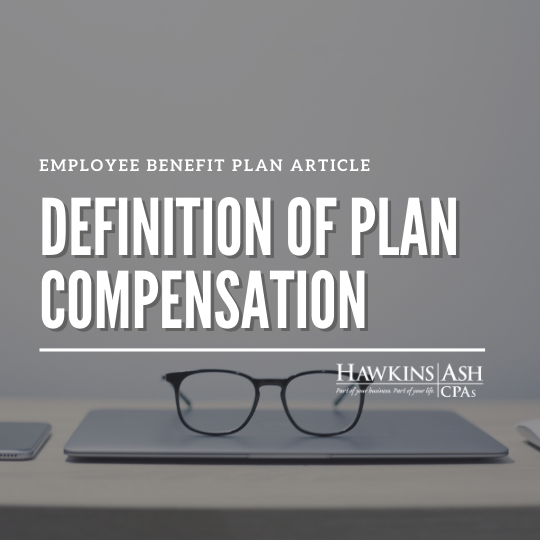Interpreting the definition of plan compensation can be frustrating. Each year the IRS and Department of Labor (DOL) reports that one of the biggest mistakes employers make is using the wrong definition of plan compensation. To help avoid this mistake, employers should consult with their Third Party Administrator (TPA). Having a knowledgeable TPA can help employers understand this area of retirement plans and provide confidence that the correct definition of compensation is being followed.
Simplifying the Definition
Many times employers get confused by what constitutes the “correct” definition of compensation. This can be fixed by simplifying the definition of compensation for their retirement plan. A standard definition of compensation is Form W-2 wages. This consists of an employee’s Box 1 W-2 wages, excluding any non-taxable fringe benefits, reimbursements from an accountable plan, worker’s compensation, and similar items. By simplifying the definition, not only will it make it easier on those who process payroll and deferrals, it will also lessen the chance of misreporting plan compensation because less items need to be coded in the payroll software.
Recieve key insights that help you optimize your employee benefit plan and ensure a smooth ERISA audit. Subscribe today!
Sign Up
Different Definitions for Employer Matching Deferrals
The plan document should clearly state all definitions of compensation, including the compensation to be used for matching deferrals. If the plan follows a calendar year and a participant becomes eligible to participate on July 1, the plan document should explain how an employer matching deferral is calculated. One plan may state that the employee’s compensation for the entire plan year is eligible for an employer matching deferral while another may choose to only include the employee’s compensation from July 1 through December 31. No matter what you choose for your retirement plan, make sure the plan document specifies what compensation is to be included for any employer matching deferrals.
Bonuses, Commissions, and Quarterly Incentives
Another common mistake is not including certain types of compensation in the total “eligible” compensation for all deferrals. Bonuses, commissions, and quarterly incentives are several examples of compensation that may not occur during every pay period, and employers may want to exclude these items from being deferred on. However, unless the plan specifically states that they are to be “excluded,” they need to be included in compensation. Misreporting compensation can lead to large penalties and the plan could lose its IRS qualified status. Additionally, this could result in a large number of missed deferrals which could slow the growth of an employee’s retirement account.
Avoiding Mistakes
To help mitigate these common mistakes, the employer needs to fully understand the definition of plan compensation and clearly state their intentions in the plan document. In addition, the employer should create a governing committee for the retirement plan. This committee should meet at least annually with the Human Resources department to make sure that any changes made are clearly stated and understood. Any changes made should be given to all employees so they are made aware of them. Finally, it is important to review the plan document, adoption agreement, and any plan amendments to ensure they align with the employer’s intentions for the plan. Don’t let a box being “checked” or “unchecked” cause you to incur unnecessary costs, potential penalties, and possibly cause the plan to lose its qualified status.





